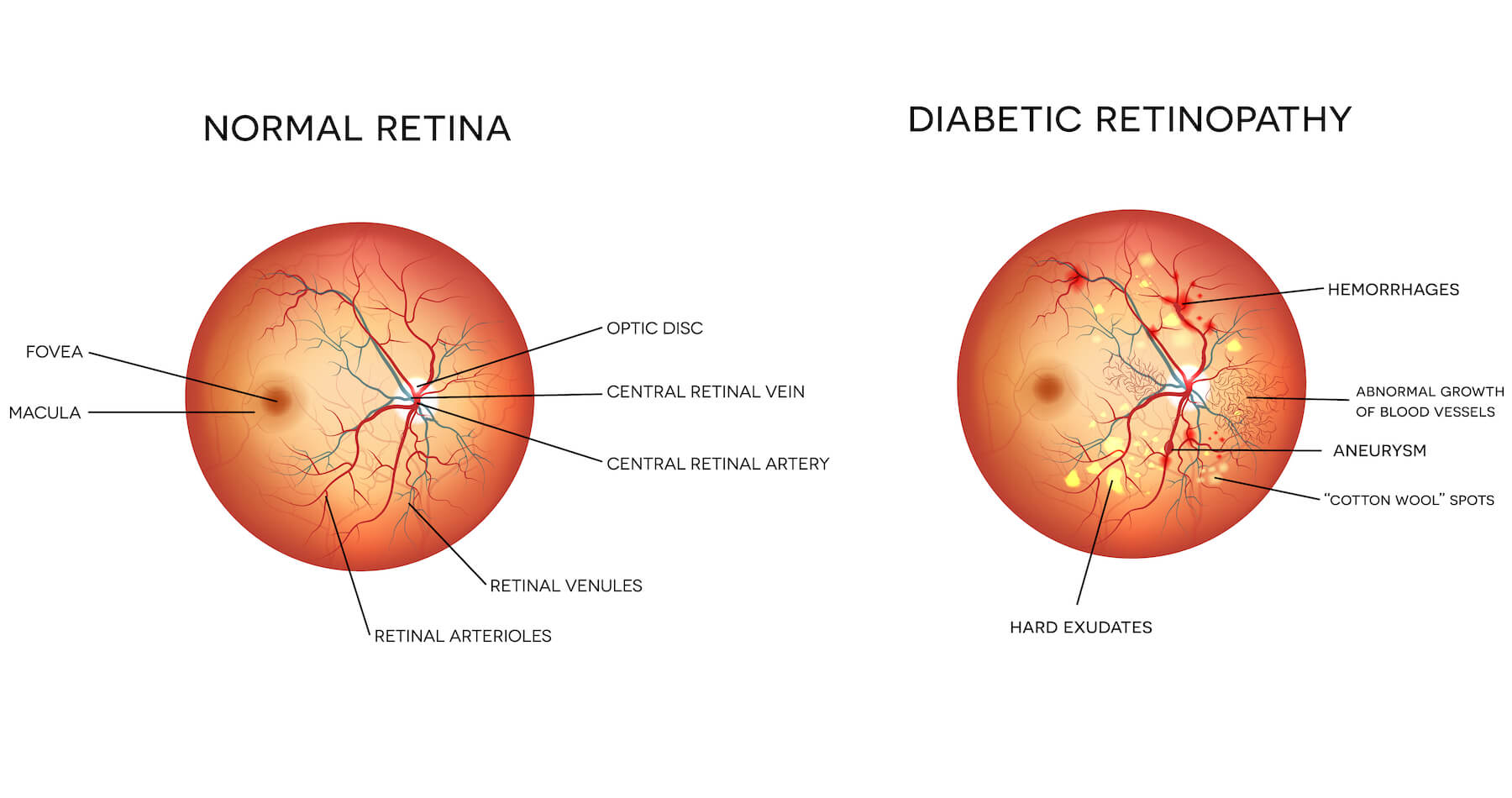Blog, News & Offers
Diabetes and sight loss
Posted on Tuesday, February 16, 2021


Diabetes is one of the leading causes of preventable sight loss in the UK. By recognising the signs of the eye conditions associated with diabetes, you can prevent future problems with your vision and eye health.
WHAT EFFECT DOES DIABETES HAVE ON YOUR EYES?
The changes in your blood sugar levels, caused by diabetes, can often affect many parts of your body and how you feel, this includes the lens inside your eye. Changes in your blood sugar levels can make your vision blurry, this can change throughout the day and even day to day as your levels fluctuate.
If recently diagnosed as diabetic or recently started treatment we may decline performing a sight test as these changes in the eyes lens can produce a spectacle prescription on the day which may have changed by the time you come to collect your new specs.
If you have diabetes, you might also be at higher risk of certain eye conditions when compared to others without diabetes; this can include cataracts, glaucoma and retinopathy.
DIABETIC RETINOPATHY
Diabetic retinopathy is directly related to diabetes and occurs when there is damage to the blood vessels in the eye. Over time, diabetes can affect the blood vessels supplying the retina of your eye due to high blood sugar levels, affecting how it works. There are different types of retinopathy, with each type progressing in stages. There are many signs we look for during assessment of the eye. Some of these are shown on the photo above and include; Haemorrhages (leaked blood vessels), Abnormal growth of blood vessels (similar to AMD, can burst leaking fluid), Aneurism (bulge of blood in weak wall of blood vessel, can leak), Cotton wool spots (Damage to the nerve fibre layers) and Hard exudates (blockage causing fats and proteins to leak into retina). Someone with diabetic retinopathy may have a combination of the above clinical signs present with varying effects on their vison.
Diabetic retinopathy doesn’t usually present noticeable symptoms because the condition is gradual. If you have had diabetes for a long time, or your blood sugar levels and blood pressure are high, you can be at higher risk.
The effects noticed will be of sporadic patches missing in a personal visual field or peripheral vision. If central vision is effected they would have Diabetic Maculopathy as it effects the central Macular rather than peripheral retina.
The picture above is an example of how someone with a few areas effected in their eyes might see.
Treatment is available for diabetic retinopathy, with several different options depending on which stage the condition has reached. Your eye care professional will be able to advise on a case by case basis. These include laser treatments to contain damage within a “wall” created by a laser to injections into the eye similar to those for AMD.
In all cases, the better the diabetes is managed the better the outcome on vision is likely to be.
CATARACTS AND DIABETES
Cataracts are a common eye condition in people aged 65 or over and usually develop gradually over the years. As diabetes can affect the lens of your eye, being diabetic can increase your chances of developing cataracts. You may find that you contract cataracts at an earlier age than expected.
When you have cataracts, the lens in your eye gradually becomes cloudy and impairs your vision. It is not painful, but it can cause symptoms like blurry vision, faded colours, double vision, or seeing a halo effect when looking at lights.
You can undergo cataract surgery to fix this, which is a very straightforward operation. It is one of the most common procedures in the UK.
GLAUCOMA AND DIABETES
If you have diabetes, you may be more likely to develop glaucoma. Glaucoma happens when there is a build-up of pressure in the eye, which can lead to damage around the retina or optic nerve if not treated.
Symptoms of glaucoma are not always noticeable but can include eye pain, redness, headaches and misty vision. Those with diabetes have a higher risk of developing glaucoma, but it can be easily treated if found early enough. You can see our other blog for more information on Glaucoma.
REDUCING YOUR RISK OF EYE DISEASE IF YOU HAVE DIABETES
The most important thing you can do to protect your overall health is to keep your diabetes under control as best you can to reduce your risk of many different health complications, including eye diseases. You should closely monitor your blood sugar levels, blood pressure and cholesterol levels.
Maintaining a healthy weight and keeping fit is also essential to reduce your risk of eye disease. Poor diet and other similar lifestyle choices can trigger many eye conditions. Quitting smoking, or not taking up smoking in the first place, is also very important for everyone’s health but particularly if you have diabetes. Smoking can increase your blood pressure and may raise your blood sugar levels.
EYE SCREENING
If you have diabetes, the NHS offers an annual diabetic eye screening service for those aged 12 and above as well as free sight tests on either an annual or biannual basis depending on your age or health of your eyes. It is crucial that you attend regular sight test appointments as well as going to your screening, as they can detect diabetic retinopathy in your eyes before your vision is affected.
The screening DOES NOT look for any other issues with your eyes such as Glasses prescriptions, Corneal health, Macular degeneration, glaucoma and cataracts as well as many more. In a nut shell that service are only looking for diabetic changes. We are able to offer screening in our non Staffordshire practices, sadly the funding for Opticians to perform screenings in Staffordshire has ended so you will be called to a mobile screening location and given a designated date and time if you are registered with a GP in this area.
Covid 19 has had an effect on Diabetic screening creating a large backlog. The diabetic services have looked at historic data to see which patients have consistent healthy screenings and as a one off due to pandemic these patients will skip a year and be seen in 2021. Any new diabetics or people with historic issues who are being monitored more carefully will still be seen.
If you have diabetes and have noticed a change in your vision you should not wait for your screening, its most likely a change in prescription but it could be something more serious, book a free sight test to make sure.
As with all sight impacting conditions there is an ever changing landscape of low vision devices and support groups to help assist a person suffering with sight loss.
Our final blog of the month will be about the latest tech on the market that can assist someone with serious sight loss.
Blog Search
Blog Categories
- News (62)
- Sunglasses (3)
Blog Archives
- March2024 (1)
- November2023 (1)
- October2023 (1)
- August2023 (2)
- June2023 (2)
- April2023 (1)
- November2022 (1)
- October2022 (2)
- September2022 (1)
- August2022 (4)
- June2022 (3)
- May2022 (3)
- March2022 (3)
- December2021 (1)
- November2021 (2)
- July2021 (2)
- June2021 (1)
- May2021 (2)
- April2021 (3)
- March2021 (2)
- February2021 (4)
- January2021 (1)
- December2020 (1)
- November2020 (2)
- October2020 (1)
- September2020 (2)
- July2020 (1)
- April2020 (2)
- March2020 (3)
- January2020 (1)
- July2019 (3)
- June2019 (2)
- February2019 (1)
- October2016 (1)
- September2016 (1)
- June2016 (1)
Offices
- Aldridge (1)
- All Offices (24)
- None (37)